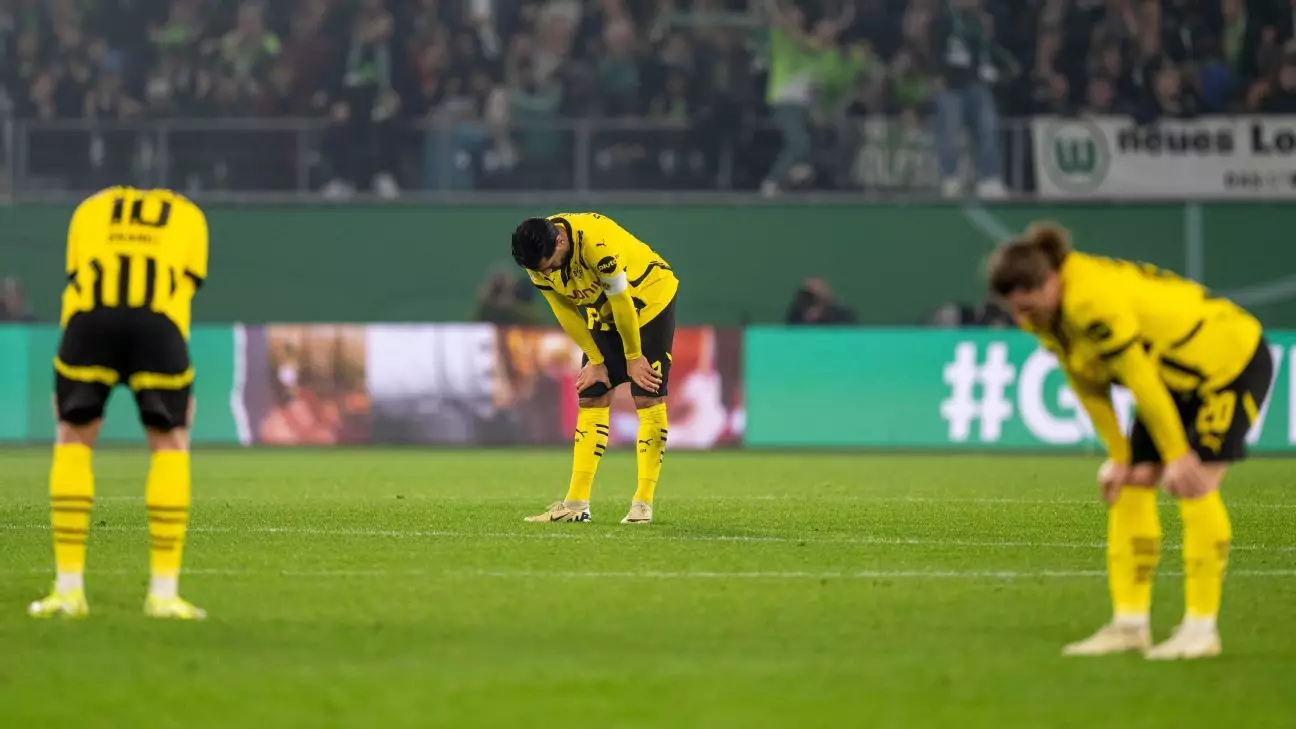Borussia Dortmund, once a beacon of hope and resilience within German football, finds itself in a spiraling downward trajectory that seems to bask more in scrutiny than success. This week, the once-mighty BVB has captured headlines—not for triumphant goals or electric plays—but rather for their disheartening performances following consecutive defeats against FC Augsburg and VfL Wolfsburg. The pressure on head coach Nuri Şahin continues to build, with criticism rising over his management strategies. This article delves into the current plight of Dortmund, examining their struggles, the tactical limitations faced by Şahin, and what lies ahead in a precariously balanced season.
The Consecutive Failures
Dortmund’s recent form has been perplexing, especially when juxtaposed against their home prowess; they remain perfect at Signal Iduna Park but falter miserably in away fixtures. The defeats have resurrected concerns surrounding the team dynamics and leadership—areas where they have evidently waned. After an initial boost provided by a goal from Donyell Malen, the team lacked the momentum and vigor required to secure victory against Augsburg. Similarly, their match against Wolfsburg saw them concede a last-minute goal that eliminated them from DFB-Pokal contention. These games serve as vivid illustrations of how BVB appears to be a fractured side, devoid of the coherence necessary to compete on multiple fronts.
Şahin’s decisions during pivotal moments of matches invite scrutiny. His tactical adjustments—particularly during the recent UEFA Champions League clash against Real Madrid—raised eyebrows when a comfortable 2-0 lead morphed into a staggering 5-2 loss. His choices reflect a second-half collapse that signals deeper problems within Dortmund’s framework. Critics emphasize that these tactical misfires can no longer be brushed aside. Moreover, the coach faces an uphill battle in assembling a competitive lineup amidst a cascade of injuries, forcing him to make unorthodox choices such as deploying Pascal Gross in unfamiliar positions. Such improvisations reveal not only a lack of adequate player depth but also a concerning lack of adaptability in high-stakes situations.
An alarming narrative unfolding in the Dortmund camp is the apparent absence of on-pitch leadership. The team has struggled to cultivate a strong, steadying presence—once evidenced by influential figures like goalkeeper Gregor Kobel and captain Emre Can. The uncertainty rippling through the squad encapsulates a broader malaise, reflecting how quickly morale can deteriorate in competitive environments. As the team gears up for the Topspiel against RB Leipzig, they must confront not just their direct rival but also the shadows of their own inconsistencies. Leipzig, led by the astute Marco Rose, presents a formidable opponent who not only knows Dortmund well but also thrives on exploiting their weaknesses.
The upcoming encounter with RB Leipzig represents a critical juncture for Dortmund’s aspirations this season. With historical context backing Leipzig, who have prevailed in recent encounters with BVB, the odds are stacked against Dortmund. The match offers a chance for redemption, but it also looms as an all-too-clear litmus test for Şahin’s future at the helm. If Dortmund’s performances continue to fall short, the patience of high-ranking officials may quickly wear thin. Managing director Lars Ricken and CEO Hans-Joachim Watzke are currently keeping options open, suggesting that a quick exit for Şahin remains improbable—yet a string of underwhelming results could swiftly alter that calculus.
Revitalization Through Future Opponents
On a different note, Bayer Leverkusen stands out as a model of success in stark contrast to Dortmund’s plight. Their ability to generate excitement and maintain a competitive edge in a crowded Bundesliga landscape has drawn attention—not only because of their attacking prowess but also due to their strategic rotations and managerial acumen. Head coach Xabi Alonso’s approach of employing squad rotation has allowed Leverkusen to keep players fresh while still delivering on the pitch, showcasing an effective model of proactive team management.
The Road Ahead
While Borussia Dortmund grapples with its present, the echoes of past glories can remind the club of what it is capable of achieving. However, it requires an honest introspection of current limitations, a reevaluation of tactical frameworks, and an urgent need for proactive leadership both on and off the field. Should Borussia Dortmund wish to restore faith among their ardent supporters, revitalization and resilience must become their rallying cries. Such efforts will not only be judged in the wake of this difficult season but will decide the broader path of Germany’s black-and-yellow giants in the years to come.

